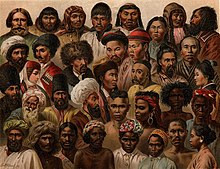Ethnicity and nationality

| Part of a series on |
| Political and legal anthropology |
|---|
|
Basic concepts
|
|
Case studies
|
|
Related articles
|
|
Major theorists
|
| Social and cultural anthropology |
In some cases, especially involving transnational migration or colonial expansion, ethnicity is linked to nationality. Anthropologists and historians, following the modernist understanding of ethnicity as proposed by Ernest Gellner and Benedict Anderson see nations and nationalism as developing with the rise of the modern state system in the 17th century. They culminated in the rise of "nation-states" in which the presumptive boundaries of the nation coincided (or ideally coincided) with state boundaries. Thus, in the West, the notion of ethnicity, like race and nation, developed in the context of European colonial expansion, when mercantilism and capitalism were promoting global movements of populations at the same time that state boundaries were being more clearly and rigidly defined.
In the 19th century, modern states generally sought legitimacy through their claim to represent "nations." Nation-states, however, invariably include populations that have been excluded from national life for one reason or another. Members of excluded groups, consequently, will either demand inclusion based on equality or seek autonomy, sometimes even to the extent of complete political separation in their nation-state. Under these conditions – when people moved from one state to another, or one state conquered or colonized peoples beyond its national boundaries – ethnic groups were formed by people who identified with one nation, but lived in another state.
Multi-ethnic states can be the result of two opposite events, either the recent creation of state borders at variance with traditional tribal territories, or the recent immigration of ethnic minorities into a former nation-state. Examples for the first case are found throughout Africa, where countries created during decolonization inherited arbitrary colonial borders, but also in European countries such as Belgium or United Kingdom. Examples for the second case are countries such as Netherlands, which were relatively ethnically homogeneous when they attained statehood but have received significant immigration during the second half of the 20th century. States such as the United Kingdom, France and Switzerland comprised distinct ethnic groups from their formation and have likewise experienced substantial immigration, resulting in what has been termed "multicultural" societies, especially in large cities.
The states of the New World were multi-ethnic from the onset, as they were formed as colonies imposed on existing indigenous populations.
In recent decades feminist scholars (most notably Nira Yuval-Davis) have drawn attention to the fundamental ways in which women participate in the creation and reproduction of ethnic and national categories. Though these categories are usually discussed as belonging to the public, political sphere, they are upheld within the private, family sphere to a great extent. It is here that women act not just as biological reproducers but also as 'cultural carriers', transmitting knowledge and enforcing behaviors that belong to a specific collectivity. Women also often play a significant symbolic role in conceptions of nation or ethnicity, for example in the notion that 'women and children' constitute the kernel of a nation which must be defended in times of conflict, or in iconic figures such as Britannia or Marianne.
Comments
Post a Comment